#Culture
Zaid Karim, Private Investigator, Part 8 – Badger
I was heartened by Badger’s prediction that Safaa and I would reunite. He possessed deep insights. His prognostications always came true, a fact that I could not explain but had learned to trust.
Published
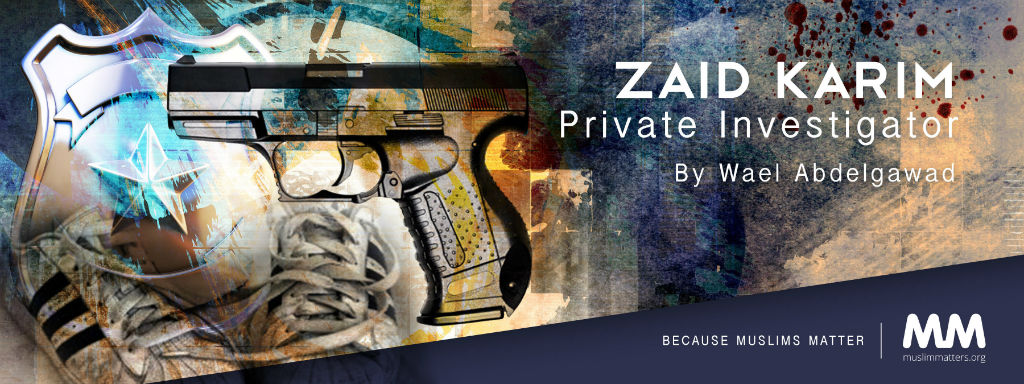
See the Story Index for Wael Abdelgawad’s other stories.
Previous chapters of this story: Chapter 1 | Chapter 2 | Chapter 3 | Chapter 4 | Chapter 5 | Chapter 6 | Chapter 7
Keep supporting MuslimMatters for the sake of Allah
Alhamdulillah, we're at over 850 supporters. Help us get to 900 supporters this month. All it takes is a small gift from a reader like you to keep us going, for just $2 / month.
The Prophet (SAW) has taught us the best of deeds are those that done consistently, even if they are small. Click here to support MuslimMatters with a monthly donation of $2 per month. Set it and collect blessings from Allah (swt) for the khayr you're supporting without thinking about it.
“I do care,” I said, and it was true. I always cared. That was my problem. One of my problems, anyway.
I told Chausiki everything, narrating a very near version of the truth, leaving out only Imam Abdus-Samad’s name. I said I’d been recruited by Horse, whose real name I did not know, and explained how in my youthful stupidity and zealousness I’d believed myself to be a part of some greater Islamic struggle.
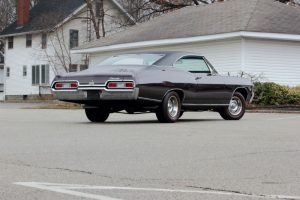
“Red died in my arms, bleeding in the backseat of a Chevy Impala…”
I told her how Red had ultimately died protecting me. How he bled out in my arms, talking about his love for his family. How we left his dead body in front of the hospital. I looked down as I described this last part, my face hot with shame. “That was when I quit,” I said. “I loved uncle Malik. If I could go back and change – “
“But you can’t.”
She was right, of course. We sat in silence. I lifted my eyes finally and watched the winter sunlight sparkling on the surface of the pool. My hair was still wet, and every time the breeze blew a chill went through me. My life was in Chausiku’s hands now. If she told Badger, I was a moldering corpse waiting to happen.
Again she seemed to read my mind. “You are a husband and a father. I see how much you love your daughter.” Her tone was stiff, belying the kindness of the words. “In spite of everything, you are Amiri’s only true friend, or so he believes. Don’t worry. I’ll keep your secret. But don’t presume to judge me. You have no idea what I’ve been through. I lived by my ideals for thirty years, and what did it get me? A dead husband and a pile of unpaid bills. When Malik died, I was penniless. I went to the masjid for a loan and they turned me away. I was homeless for a while, did you know that?”
I shook my head.
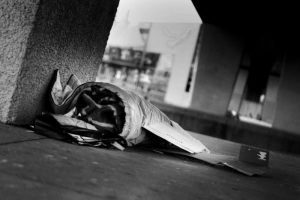
“I lived in a cardboard box…”
The corners of Chausiku’s mouth turned down in bitterness. “I lived in a shelter downtown, and sometimes in a cardboard box. Do you know what saved me?”
“No.”
“Amiri. My son. He stepped up, became a man, took care of me. So don’t you dare come in here and lecture. You haven’t slept in a box. You haven’t suffered the humiliation of relieving yourself on the street, having people look at you like you’re subhuman. I tried living a principled life. Then I grew up. Can you understand that?”
I nodded, saying nothing.
“Get dressed.”
I did. In the bathroom, I noticed that the strand of hair I’d placed carefully on my belongings was gone. They had searched my clothing as well, and perhaps looked through my wallet and phone. It didn’t matter. I had nothing to hide anymore.
When I returned to the patio, Chausiku said, “Be in front of the used bookstore at Van Ness and McKinley in an hour. Amiri will meet you there.”
“Oh, and Zaid,” she added as I turned to leave.
“Yes, Auntie?” I met her gaze, finally. She sat at the patio table with legs crossed and hands resting primly on her knees. Her spine was erect, her eyes as flat as flint stones.
I had a sudden memory of sitting at the kitchen table in the Sulawesis’ old house on First Street, along with Aziz, Amiri, Titus and Tarek – all five of the Five Musketeers. We chatted about baseball and skateboards and Kali, and ate hot cornbread with butter. Chausiku’s given name, I knew, was Amanda. She’d become a Black Panther revolutionary in the early seventies and adopted the name Chausiku, which, she liked to remind us, meant “born at night.” “What do you think?” she’d ask us. “Do you see the night stars in my eyes?” I would look at her and yes, it seemed like her sparkling black eyes held the answers to the mysteries of the universe, and that I could see the twinkling of the stars in their depths.
Now, there were no stars in her eyes. She sat there looking angry, rich and sadly pedestrian, seemingly unconcerned that she had betrayed everything she once believed in.
“You are no longer welcome here,” she said. “Don’t come back.”
* * *
Friday, February 5, 2010 – 11:15 am
Fresno, California
I had time for a quick detour before heading to the bookstore. I knew that Safaa would be in class, but I needed to see her.
The Fresno Islamic Academy was a small school, funded as much by donations as by the monthly tuitions. It was located on Shaw west of Cedar, not too far from Masjid Fresno, the oldest masjid in town. The front door at FIA was always locked during school hours. I knocked, and the door was opened by the receptionist, a young Somali woman named Asma. She knew me and greeted me with a smile.
A small Pakistani-looking boy sat in a chair in the reception area, rhythmically filling his mouth with air and making popping sounds with his lips. I wondered if he was waiting to see the principal for some infraction.
“Ali,” Asma commanded the boy. “Go get sister Safaa.” Pleased at this reprieve from whatever doom awaited him, the boy leaped up and dashed through the open door that led into the school corridors.
“Cool hat,” Asma commented.
I nodded but said nothing. The last thing I needed was for Safaa to accuse me of flirting with the receptionist. Sensing my mood, Asma went back to work, and I took the boy’s chair and waited.
Time ticked by. I checked my watch repeatedly, aware that I had an appointment across town with one of the most dangerous men in America.
“What is it?” Safaa stood before me, arms akimbo. “I’m in the middle of class. This had better be important.” She wore a long black skirt that was a little too tight for my liking – I mean, I liked it fine, but I didn’t think it appropriate for everyone else – along with a long-sleeved blue blouse and a burgundy hijab. She looked and sounded about as happy to see me as a judge staring down at a repeat offender who stood before the bench accused of yet another crime.
In spite of the irritation on her face, she was a vision. Her skin was dark for an Iraqi, somewhere between copper and coffee. She’d been teased about that as a child, she once told me. She had often complained about her nose being too big as well, as well as other imperfections that she saw or imagined in herself.
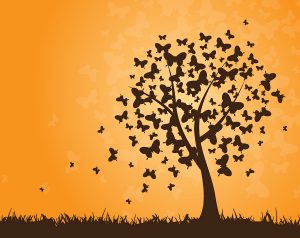
“In my eyes, she was lovely as a tree.”
In my eyes, she was as lovely as a tree. I found her utterly beautiful from crown to roots.
I stood. “Could we talk in private? I have something for you.”
“What is it? I’m busy. If you can’t respect my job and my time, I might have to file a restraining order.”
“It’s important.”
She clucked her tongue. “Fine.” She turned and walked away. I followed her into the unoccupied computer room two doors down from reception. The computers sat on long tables that circumnavigated the walls. The FIA had come a long way since I was a student there. Back then it was bare bones. No computers, no science lab, no athletic equipment. Just pure academics, and a couple of ping pong tables for fun.
“How have you been?” I said. “I’ve missed you.”
Safaa pursed her lips and made no reply.
“You’ve been so cold and angry lately,” I commented.
She didn’t like that. “Why is that a problem?”
I opened my hands in a helpless gesture. “Because we’re husband and wife. Because we have a daughter together. Because I thought we loved each other.”
“This is outrageous,” Safaa snapped. She turned to leave.
“Okay, hold on!” I withdrew an envelope from my pocket and handed it to her.
“What is this?”
“Five thousand dollars. That’s my child support backlog, and a little extra. I’d like to set up a regular visitation schedule with Hajar.”
“Wow.” The anger was replaced by surprise, at least momentarily. “You’re on a case?”
“Yes. Can I tell you one more thing?”
Her jaw tightened. “What?”
“I’m disappointed in you.”
Her mouth fell open and her eyes widened. “You’re disappointed in me? In what bizarro universe does that make sense?”
“I’ve never been unfaithful to you. Wallahi I never wanted to, or even considered it. You and Hajar are everything to me in this dunya. I love you. When I pray, I pray for you to fulfill your dreams. When you smile, it heals my heart. Just thinking of your laughter makes me happy. When you feel the chill of the world upon you, I yearn to warm you with my arms. When you’re tired, when you’re down on yourself, I have enough faith in you for both of us.”
I hadn’t planned this lyricism or memorized it in advance. Safaa had always brought out the poet in me. I wished that I could turn my words into almond blossoms and scatter them at her feet. I wanted to feel her head resting on my shoulder once again. I wanted to be a shelter and a garden for her when dark days came, as they always do in this life.
I had to drop the hammer, though. I had to shake her up.
“Yet,” I continued, “you choose to listen to rumors and gossip spread by people with bad intentions, rather than believe in me, your husband. I thought you were better than that. In fact, I know you are better than that.”
For the first time since our separation, I saw a chink appear in her armor. Uncertainty passed across her features like a cloud across a winter sky. Her mouth opened but no words came out.
She found her tongue. “I’ll email you about visitation.” With that she turned and walked away.
I counted it as a victory. One does not traverse Antarctica in a day. There were a lot of people in the community who mistrusted me, a lot of voices arrayed against me. That didn’t matter. In the end, all that mattered was trust. If I could somehow open Safaa’s eyes and restore her trust in me, the love between us would return like spring rain after a drought, I was sure.
I loved Safaa, but I didn’t understand her sometimes. I’d found as I got older that I was beginning – just beginning – to know myself, to know who I was. Unfortunately I still had no idea who anyone else was.
* * *
In spite of its expansive name, the Bookazon was a cluttered corner of tranquility a few blocks from City College, not far from Masjid Madinah. Formerly a three bedroom house, it was jammed from floor to ceiling with mostly used books, though there was some new selections as well. In spite of the crowding, the owners had managed to fit several comfy armchairs into corners here and there. I sometimes went in after Jum’ah. I’d sit in one of those comfy chairs and read for an hour or more, and the management never seemed to mind.
I arrived five minutes ahead of my appointed time to find that the sign on the door had been turned to the “Closed” side. That was unusual. The Bookazon didn’t normally close at lunchtime. Two women – one a hip-hoppy Asian, the other an attractive Latina – stood near the entrance, one on either side.
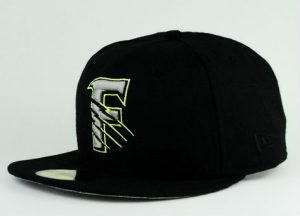
“Her hair was tucked under a Fresno Grizzlies cap.”
The Asian woman was small and could have been any age between twelve and twenty five. Her hair was either cropped short or tucked under her Fresno Grizzlies baseball cap. She could almost have passed for a boy in her baggy basketball shorts, gray sweatshirt and black Adidas hi-top shoes.
The Latina was my height. She had lustrous black hair, full lips, and a hard cast to her hazel eyes. She was dressed like a college student in jeans, a City College sweatshirt and stylish brown boots.
I approached the door to try the knob and maybe peer through the window, but the Latina stepped to bar my way.
“Closed for lunch,” she said in English that might have sounded unaccented to anyone else. I have a good ear for accents and could hear her Mexican ancestry in the slightly lisped “s” in “closed” and the o-sounding “u” in “lunch.”
“I’ll look myself if you don’t mind.” I moved to step around her but she blocked me again and – like a Vegas magician doing a hey presto – pressed the barrel of a silver automatic pistol against my forehead, jamming it into me hard enough to tip my head back. She was fast. I hadn’t even seen her draw the gun.
“You best get steppin’, cabron,” the Latina said quietly but intensely. “Before I drill your dome. We’ll see what comes out. Brains or frijoles negros.”
My nostrils dilated and my teeth clenched, not because of her calling me a bastard or saying I had black beans for brains, but because of the gun at my forehead. I had a vast internal reservoir of anger, love, guilt, grief and outrage, and it was never more than a nerve’s length away. I could access it in an instant, for good or bad, like a tap that is under pressure and needs only a quarter turn of the handle to send forth a geyser.
“Dale cabron,” I snarled in Spanish, returning the insult and daring her to shoot. “But you best look down before you pull that trigger.” The full-lipped Latina glanced down to see the blade of my knife pressed against the inside of her thigh – my own hey presto to match hers. Her eyes widened slightly. The knife was angled up, so that the Latina could not step away without cutting herself.
“That’s your femoral artery,” I informed her. “I cut that and you’ll bleed out in six seconds. The knife is razor sharp. It’ll go through your jeans and skin like a bullet through paper. Even if you shoot me, I’m gonna slice you open on the way down.”
A gun cocked and I felt yet another steel barrel press into the base of my skull beneath the brim of my fedora.
“Don’t you hurt her!” the Asian girl screamed. “Put the knife down or I will freakin’ cap you right now.”
“Go ahead,” I said, fighting to keep a grin from breaking out on my face. I wanted to laugh, not because I didn’t take the Asian seriously, but because I always wanted to laugh when my life was on the line. “If you do, your girl is dead.” Then I recited the shahadah – the Muslim testimony of faith – in Arabic, out loud. I was fully prepared to die in that spot, standing on the sidewalk on Van Ness Avenue on a cool February morning.
My behavior made no sense. In prison I’d survived by being ready to die. When a man sees that you are willing to die to defend your property, your dignity and the smallest right that he might seek to infringe, he turns around – if he has any sense – and walks away.
Now, though, things were different, I had a wife and daughter who I loved. I had a career, shaky and erratic though it might be. I had freedom, relative youth, the wispy sunshine on my face, and the blessing of faith. I had everything to live for, but here I was, challenging this woman to pull the trigger because I didn’t know how to conduct myself as a free man, and could not shut off the electric thrill that ran through me at the prospect of violence.
I was a mess. I knew that. I was a flawed personality, a damaged machine. All my cylinders were firing, but something was busted in the gearbox, and the grinding of my spirit was so loud I wondered that the whole city couldn’t hear it.
The Latina and I were so close our noses almost touched. I smelled lemon and chiles on her breath. Her eyes were large and dark, and I thought that if I stared into them I might become mesmerized and forget who and where I was. Then, to my surprise, the corners of her mouth turned up in the barest hint of smile. “You wouldn’t happen to be Stick, would you?” she said softly.
“You know my name,” I assented. “So you must know whether you plan to kill me or not.”
The Latina withdrew the gun and stuffed it in her waistband, hiding it beneath the baggy sweatshirt. “Yo, it’s cool, Pinkie,” she said to her friend. “Put the gun away.”
The pressure of the gun disappeared from the back of my head. I folded my knife one-handed and stepped back where I could see them both. Pinkie was – true to her name – pink-faced with fear or rage. She’d tucked her gun away but still had her hand on the grip, I could tell.
The Latina nodded in greeting. “I’m Jelly. This is Pinkie.” She inclined her head toward the bookstore. “Badger’s waiting for you inside.”
I turned my back on the ladies, feeling fairly confident that they would not shoot me. As I opened the door and entered the store, an argument ensued between Pinkie and Jelly. Apparently Pinkie was angry because she thought Jelly was flirting with me. I supposed the two of them were a couple.
Only in Badger’s world – or in an elliptical orbit around his world – could I meet people for whom threatening to kill someone was a form of flirtation.
* * *
The bookstore was deserted. The lights were off and there were no customers, and not even a salesperson or cashier behind the register. I found Badger in one of the back rooms, sitting in an armchair with one leg draped casually over the arm, reading The Downfall of Communism and Capitalism by Ravi Batra.
My old friend Amiri Malik Sulawesi, who went exclusively by the name Badger these days, was shorter than me at 5’6” or so. He was the color of cafe au lait, and was wiry and strong. He wore black slacks, comfortable-looking brown walking shoes, and a blue trenchcoat over a white t-shirt and bulletproof vest. I had no doubt that he had one or two guns secreted on his person somewhere.
I wasn’t surprised to see him reading a treatise on economics and social philosophy. Badger was the most brilliant human being I had ever met. In school he’d achieved straight A’s even though he barely studied. He could glance at a page and absorb the content in seconds. Furthermore, he would remember it years later. I recall seeing him at the age of ten, sitting on the playground during recess, reading Locke’s Essay Concerning Human Understanding – a memory that came back to me years later when I had to study it in university. In Kali class he always beat me during sparring sessions, not because he practiced more than me – no one in the group practiced as obsessively as I did – but because he was able to instantly internalize whatever was taught, intuitively grasping the underlying principles of body mechanics, so that he did not have to remember specific techniques per se.
He could have been anything he wanted. Neurosurgeon, astronaut, technology innovator, anything. He could have changed the world.
“Seems to me that book is obsolete,” I commented by way of greeting. “Communism has already fallen, and capitalism is taking over the world.”
“Yeah homey,” Badger replied, “but you know this book was written in 1978. Batra said Communism would fall within twenty five years, and twelve years later the Berlin wall come tumblin’ down. Man was a genius. He predicted that capitalism was doomed to extinction as well. He says here that money was meant to serve man, not the other way around, and that the abandonment of spirituality and social justice under unregulated capitalism is unsustainable. He proposes a quadrivisional model of society with acquisitors, money lenders, thinkers and warriors. He says capitalism is run by the money lenders and acquisitors, and out of the rubble of its collapse will come the rise of the warriors and thinkers. Basically he suggests that these four cultural classes rise and fall in cycles.”
“Some of that sounds like Islamic philosophy,” I pointed out. “I mean the part about spirituality and social justice. Capitalism and Communism are flip sides of the same coin. They’re both systems based on the distribution of wealth. Islam instead proposes a society based on human values, where everything begins with submission to Allah and compassion for one’s fellow man. Instead of allowing people to hoard wealth, or forcibly taking it away, Islam establishes systems, like zakat and the abolition of usury, that prevent the accumulation of too much wealth in the hands of a few. Plus, Islam encourages people to share their wealth fee sabeel-illah.”
Most of this was knowledge I had acquired from Shaykh Rashid during my time in Qatar. He’d been keen to teach us the Islamic worldview, rather than just halal and haram.
Badger pointed at me and clucked his tongue. “You’ve been reading Sayyid Qutb. That part about human values is straight out of Milestones on the Path.”
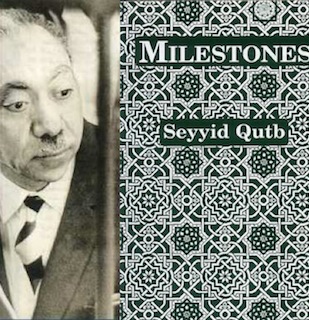
Milestones on the Path
He was right. Milestones was one of the books I’d studied in high school. But it surprised me that Badger recognized it. “I didn’t know you read Islamic books,” I said.
Badger stood from the chair and stretched. “Of course homie. Ain’t nothin’ new under the sun.” He waggled the book back and forth. “Whatever solution these thinkers stumble on, Islam beat ‘em to it. I wouldn’t be surprised if Ravi Batra read Milestones too.”
“And what’s your take on it?”
“Oh, Ravi Batra is right. Modern capitalism is unsustainable, not only for the reasons he described. Technology gonna snatch the means of production away from the bourgeoisie and put it in the hands of the common man. It’s already happening. A child can write code. Anyone can set up an online store, any writer can indie publish. Open source software be better than commercial. And 3D printing gonna do the same for physical goods. It won’t be long before you can download open source digital blueprints for any object, then print that object in plastic. Even a open source house. You’ll download digital plans into a CNC machine that’ll cut the wood. The pieces come out numbered and built to slot into each other. No tools required. Voila, instant house.”
“That’s incredible.” I didn’t ask Badger if he was sure that such a thing was possible. If he said it, it was almost certainly true.
“Yeah homie. So what happens then? A lotta manufacturers operate on razor-thin margins. People start making their own stuff, these vertically structured corporations topple like dominoes. What other things nations war over?”
I tongued my front teeth, thinking. “Energy. Land. Water.”
“Precisely. In twenty years, solar and fuel cell technology gonna be so efficient, oil and coal will be obsolete. That’ll turn the world upside down right there. That leaves only land reform, since the means of food production is soil and shovel. If every homeowner start plantin’ vegetables and fruits ‘stead of grass, these corporate growers and their patented GMO crap go belly up.”
“What about water?”
Badger nodded. “True dat. Future wars gonna be over water. Thing is,” he went on, “these trends gotta play themselves out. Before capitalism falls we’ll see extreme separation of rich and poor. Think Brazil, China, South Africa, but worse. Riots, chaos, anarchy. I’d say fifty years ‘fore it all crashes down. What do I care, though? Men like you and me thrive in chaos.”
I shook my head and laughed. “You maybe. Not me. I have a wife and child.”
“Yeah, how they doin’?”
“Safaa and I are separated.”
He curled his bottom lip in surprise. “Hmm. That won’t last. Keep doin’ what you do, she’ll come around.”
“Why do you say that?”
“‘Cause you a good man and she a good woman. One in a thousand, both of you.”
“Huh.” I was heartened by Badger’s prediction. He possessed deep insights. His prognostications always came true, a fact that I could not explain but had learned to trust.
“What about you?” I asked. “What are you up to these days?”
Badger shrugged. “Rippin’ and runnin’ like always, how I do. Git up to git down.”
Badger’s broken speech annoyed me. He’d grown up speaking the King’s English. He was perfectly capable of grammatically correct syntax. He was playing a part, I knew. Showing people what they expected to see, or maybe allowing people to underestimate him so he could spring the whammy at the right moment. In any case it wasn’t my business to tell him how to talk.
I rolled my eyes. “I meant aside from that. Don’t you have anything else going?”
“Just the game, brother. Always the game.”
I looked around. “What’s with the store? Where is everyone?”
“Oh you know, I shut the place down to browse. I can’t be mingling with strangers. The bounty on me is up to a million dollars.”
“And the owners let you do that?”
“I am the owner, or my corporation anyway. I own lots of businesses this side of town.”
That made sense. How else could he launder all that cash he stole? He couldn’t funnel it all through his mom. That would attract attention.
Badger shelved the book, approached me and without warning threw a straight right cross, not pulling the punch at all. I parried it easily, and came over the top with a forearm strike that would have smashed him in the nose if he hadn’t blocked it. Badger caught my strike, rolled his elbow over my arm and pulled me into a hug.
“You a sight for a tired heart, brother,” he said, then stepped back.
“You don’t want to pat me down?”
“Naw homey. If I can’t trust you I got nothin’ left.”
“Your mom’s bodyguard patted me down. In fact your mom made me take a dip in the pool, I’m guessing to make sure I wasn’t wired.”
He grinned. “The higher the bounty go, the more paranoid she get.”
“You could do something else with your life, you know. You could do almost anything.”
He waved this off. “Anyway watchu need? Mom say you need help with a case.”
I told him about the case and everything I’d learned. “Do you know why the Cambodian Bulldogs might be looking for Tarek?”
He shrugged. “Sound to me like T-Bone maybe scored some dope on consignment and didn’t pay up. Or he borrowed money maybe.”
Apparently everyone knew Tarek’s nickname but me. “Okay, well what about Angie? Do you know where she might have gotten the forty five thousand? Have you heard of any dealers getting robbed recently?”
He shook his head. “Ain’t no one crazy enough for that.”
“Except you.”
“Fo’ shore. Why you think they call me Badger?”
“Because you’re short and fuzzy headed?”
He laughed. “You know, anybody else talk to me like that I put a bullet in ‘em.”
“Must be nice. Well, I need to find Tarek ASAP. I hear he’s living in one of the drug dens on Jamestown. I don’t know that area.”
“You need a guided tour.” He nodded. “I can do that. Come on.”
Badger stuck his head out the front door of the bookstore and whistled loudly through his teeth. Then he threaded his way through back through the store. I followed him through a yellow wooden door into a small stockroom, and from there through a rear exit that consisted of a thick wooden door with a vertical deadbolt and a heavy duty metal screen door. He peered out the back window for a moment, then exited through the door.
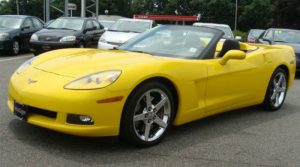
“Jelly sat behind the wheel of a yellow Corvette convertible.”
In the parking lot behind the store, the women were already waiting. The Latina – Jelly – sat behind the wheel of a yellow Corvette convertible, parked back-in against a low brick wall. Pinky stood beside the passenger door, her hand tucked beneath her sweatshirt, no doubt gripping her gun. She flashed a hand sign to Badger, which I assumed was the all-clear.
It wasn’t unusual for Badger to take on helpers. I wondered what had happened to the curly-headed Mexican youth he’d been working with last time I saw him. Badger’s partners were not jumped in or beholden to him in any way. They were equals, free to depart. Maybe the boy had gone back to school, or moved away. Or maybe he was rotting in an early grave. I didn’t ask because I didn’t want to know.
A young white guy with acne and black hair tied in a ponytail stood in the parking lot, smoking an electronic cigarette. The smoker gave Badger a genial nod. “You done Mr. Badger sir?”
“Yeah. Thanks, Jerry.”
“Anytime, Mr. Badger sir.”
I chuckled at that. Mister Badger. Like he was a character from Wind in the Willows. “How much you pay that kid?” I asked when we were seated in the car, Badger and I in the backseat and the women in the front.
“A lot more than he used to make at Barnes and Noble, tell you that. Listen here, ‘fore we go looking for Tarek, I need your help with a li’l su’m su’m’.”
“What?”
“Little job we got planned.”
My internal alarm bells began to ring as if the entire neighborhood were burning down. There were no “little jobs” where Badger was concerned.
“Hold up,” I objected. “You want me to help you move furniture or wash your car, I’m down. But if you mean what I think you mean, forget it. I’m on the straight and narrow, Badge. Sirat al-mustaqeem. I have a family to think about.”
“It ain’t all that. All you got to do is drive. You come ‘round askin’ for my help, well I need yours.”
I rubbed my hand over my cheeks and forehead. This was a bad idea. Everything I was trying to cultivate in life: compassion, patience, sincerity – all these qualities were like trees struggling in a drought, while Badger was a forest fire that would incinerate them in an instant. I shouldn’t have come to him. I could find Tarek on my own. It would just take longer, and wear out a lot more shoe leather, and be more dangerous.
But no. I didn’t have time for that.
“Okay,” I said.
“Que bien,” Badger enthused in perfectly accented Spanish. “Good man. Andale, Jelly. Vamonos!”
“Pull around to my car for a sec,” I requested. My car would probably be safe parked in front of Bookazon for a few hours, but I wasn’t leaving the money and gun. I activated the trap and withdrew the remaining cash. It was just under three thousand. I also took out my gun, which I strapped to my ankle.
I hopped back into the convertible, and ten minutes later we sidled up to the curb in a quiet residential district off Kings Canyon Avenue. This was a lower-income neighborhood, but the residents took pride in their smaller sized homes and older cars. The homes were well maintained, and the yards neatly mowed and trimmed. At this time of day, with the adults mostly at work and the kids at school, the neighborhood was quiet.
Badger took a pair of binoculars from the seat pocket in front of him and handed them to me. “Green house halfway up the block, other side,” he said.
I peered at the house in question. It looked like any other house in the neighborhood, except that a tall, heavyset bald man in a purple track suit sat in a rocking chair on the front porch. He looked like a Pacific Islander, maybe Samoan or Tongan. He was reading one of those little Archie comic books that are sold on the aisle racks at the grocery store.
Moving the lenses around, I saw that the windows of the house were heavily barred.
“You see the front door?” Badger asked.
I studied it. “Looks like an ordinary wooden door.”
“It ain’t. That’s a veneer. Underneath it’s heavy duty steel.”
“So?” I didn’t need to know how he knew that.
“So what do that tell you?”
“It tells me,” I said flatly, “that it’s a stash house, and whatever you’re up to I don’t want to be involved.”
“Once me and Jelly effect entry,” Badger said as if I had not spoken, “you pull the car directly in front of the house and wait. You know the Q-Ball towing yard two miles southeast of here, by 99?”
I nodded.
“Once we all in the car, you burn rubber straight for that yard. That’s all you gotta do.”
With that, Badger, Jelly and Pinkie exited the car. Pinkie stripped off her outer garments and tossed them into the front passenger seat, revealing a slender, feminine body in a black mini skirt and semi-transparent black sleeveless blouse. She took off the ball cap and shook out a mane of long, silky black hair. Lastly she shucked the Adidas sneakers and slipped on a pair of black high heels that she took from under the car seat.
I averted my gaze, aware that it was rather a strange situation in which to practice Islamic modesty. It was easy to look away. Pinkie at her best couldn’t compare to my wife Safaa. Safaa was a true beauty. If my life were a fairy tale, Safaa would be the princess, and I’d be the toad.
As Pinkie strolled casually up the sidewalk toward the stash house, Badger and Jelly opened the trunk of the car and began their own transformations. Jelly donned a bulletproof vest and black ski mask that she pulled over her face. Badger was already wearing a vest, and he too added a ski mask. Both of them strapped on utility belts. To the belts they attached holstered 9 mm Glock pistols and green canisters that looked like Thermoses with pockmarks and handles.
“Are those grenades?” I asked, stunned.
“Flash bangs,” Jelly replied. “M84’s.”
“I can’t be a part of this, Badge. You have to do this some other time.” My heart was beginning to thud in my chest. I’d been a part of operations like this many, many times, and I’d paid the price. This was the last place in the world I wanted to be.
Badger worked the slide on his Glock, popped in a magazine and slid off the safety. “Ain’t no other time. There’s normally two guards, but one of ‘em make a lunch run every day at this time. You in it to win it, Stick. We movin’ and groovin’.”
Badger and Jelly completed their ensembles by hefting short-barreled Mossberg shotguns with black pistol grips. They looked like commandos about to take on the army of a small European nation. Last of all, Jelly slung a large black messenger bag over one shoulder.
“I suggest you take off that Fedora,” Badger said, “and put on Pinkie’s ball cap. You stand out like Omar Sharif at a KKK rally.” With a last nod to me, Badger said, “Eyes open, Stick.” He and Jelly ducked low and scurried up against the houses on the same side of the street as the stash house. Keeping low, they hugged the walls of the houses and slipped forward, darting across open spaces and using trees and shrubbery as cover.
Cursing under my breath, I scurried into the front seat. The engine was still running, never having been shut off.
Not for the first time in my life, I asked myself how I kept ending up in these preposterous situations.
Peering through the binoculars, I saw Pinkie stroll right up the short flight of steps to the stash house’s porch, her slim hips swaying, her long black hair stirring in the late winter breeze. She began to flirt with the big Samoan in the rocking chair. She smiled, flipped her hair, and touched his arm lightly. After a few minutes the Samoan stood and knocked on the front door. Someone inside must have said something, because the Samoan called out a reply, and the door opened.
By that time, Badger and Jelly were already in position, crouching beside the low wall that edged the steps up to the porch. As soon as the door opened, Jelly stood and fired her shotgun into the Samoan’s belly from less than five feet away. I almost dropped the binoculars in shock. I don’t know why I was surprised. I knew what Badger and his people were like, and I’d certainly seen – and committed – my share of violence in the world. But to be so outrageously cold-blooded! I made up my mind to simply drive away. I’d never agreed to be part of a murder.

“I adjusted the binoculars…”
I adjusted the binoculars and saw to my amazement and relief that the big Samoan was not down. His face twisted with rage as he reached behind his back, presumably for a weapon. Jelly charged up the steps and fired into the Samoan’s chest from almost point blank range. The man folded almost in two and collapsed to the ground. Jelly fired into him once more for good measure.
Meanwhile Pinkie caught the door before it could close, pulled it all the way open and propped it open with the chair the Samoan had been sitting on.
By this time Badger was up the steps as well. He and Jelly hugged the wall on each side of the door. They both removed flash-bang grenades from their utility belts, pulled the pins and threw them into the house. A second later there was a tremendous crack of noise and a burst of light through the window and open door that made me wince even in broad daylight.
This entire operation, from the first shot fired to the tossing of the flash bangs, had taken no more than seven or eight seconds. It was obvious they had practiced this maneuver many times.
Badger was first in. He charged in crouched low, firing his shotgun as he went, and Jelly followed immediately, pausing only to unclip her roll of duct tape and toss it to Pinkie. The slender Asian girl rolled the Samoan over and duct taped his hands behind his back, then his ankles and finally his mouth. What was the point of that if the man was dead? Lastly she took a huge pearl-handled handgun from his waistband, and followed the others into the house.
I scurried around to the front seat of the car and pulled up in front of the stash house. Gunfire had erupted inside the house, along with shouts of anger and screams of pain. I reached down to my ankle and drew my gun. The gunfire inside the house intensified, and what sounded like a fully automatic machine gun roared into life. It was hair-raisingly loud, shattering the stillness of this neighborhood like a bomb. My heart raced and my hands jittered.
The gunfire went on. I heard the pop of handguns, the booming of shotguns, and the continued scream of the machine gun. The windows of the house shattered. Chunks of wood flew from the walls as bullets tore through. A bullet struck the car with a loud pang, and I ducked low in the seat.
Gradually the gunfire diminished until it was just the occasional shotgun blast, punctuated by ripping volleys from the machine gun. Someone screamed something that I couldn’t make out.
This wasn’t right. They should have come out by now. The continued gunfire was a bad sign. There was no doubt that some of the residents would have called 911 by now. Multiple police cars were probably already racing this way. If I remained here, I’d be nabbed as an accomplice to whatever had happened inside the house. I could very well spend half my life in prison.
On the other hand, I could not abandon Badger. He was a bad man, I was under no illusions about that. One might even call him evil. But he was my friend. I could not leave him here.
I also could not leave the big Samoan dying on the front porch.
I put my hands on my head and squeezed. La ilaha il-Allah, I said to myself. La ilaha il-Allah.
I am a man of action. I don’t always make the right choice. Sometimes I make dismayingly bad choices. But I don’t sit still and wait for the world to decide on my behalf. Right or wrong, I act.
I opened the car door, stepped out and ran toward the stash house.
***
Next: Zaid Karim Private Investigator, Part 9: Stash House
Reader comments and constructive criticism are important to me, so please comment!
Keep supporting MuslimMatters for the sake of Allah
Alhamdulillah, we're at over 850 supporters. Help us get to 900 supporters this month. All it takes is a small gift from a reader like you to keep us going, for just $2 / month.
The Prophet (SAW) has taught us the best of deeds are those that done consistently, even if they are small. Click here to support MuslimMatters with a monthly donation of $2 per month. Set it and collect blessings from Allah (swt) for the khayr you're supporting without thinking about it.
Wael Abdelgawad's novels can be purchased at his author page at Amazon.com: Wael is an Egyptian-American living in California. He is the founder of several Islamic websites, including, Zawaj.com, IslamicAnswers.com and IslamicSunrays.com. He teaches martial arts, and loves Islamic books, science fiction, and ice cream. Learn more about him at WaelAbdelgawad.com. For a guide to all of Wael's online stories in chronological order, check out this handy Story Index.


Israel Seeks Escalation For Latitude – The Regional “Conflict” Widens

Post-Ramadan Reflections From A Mother Of Littles

[Podcast] Palestine in Our Hearts: Eid al-Fitr 1445 AH

Foreign Affairs Official Resigns Over Gaza Genocide

A Ramadan Quran Journal: A MuslimMatters Series – [Juz 30] Solace For The Sincere And Vulnerable

IOK Ramadan: 7 Qualities of Highly Effective Believers | Keys To The Divine Compass [Ep18]

IOK Ramadan: Choose Wisely | Keys To The Divine Compass [Ep15]

IOK Ramadan: Making Time for Allāh at Night | Keys To The Divine Compass [Ep21]

IOK Ramadan: Appreciating the Prophet ﷺ | Keys To The Divine Compass [Ep22]

IOK Ramadan: They Were Not Created Without Purpose | Keys To The Divine Compass [Ep23]

IOK Ramadan: The Importance of Spiritual Purification | Keys To The Divine Compass [Ep30]

IOK Ramadan: The Power of Prayer | Keys To The Divine Compass [Ep29]

IOK Ramadan: The Weight of the Qur’an | Keys To The Divine Compass [Ep28]

IOK Ramadan: Families of Faith | Keys To The Divine Compass [Ep27]

IOK Ramadan: Humility in Front of the Messenger | Keys To The Divine Compass [Ep26]
Trending
-
#Islam3 weeks ago
IOK Ramadan: 7 Qualities of Highly Effective Believers | Keys To The Divine Compass [Ep18]
-
#Islam3 weeks ago
IOK Ramadan: Choose Wisely | Keys To The Divine Compass [Ep15]
-
#Islam3 weeks ago
IOK Ramadan: Making Time for Allāh at Night | Keys To The Divine Compass [Ep21]
-
#Islam3 weeks ago
IOK Ramadan: Appreciating the Prophet ﷺ | Keys To The Divine Compass [Ep22]
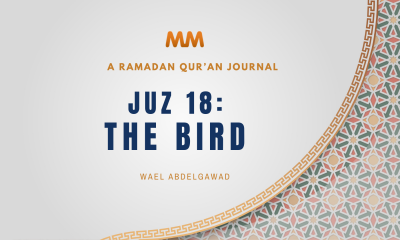

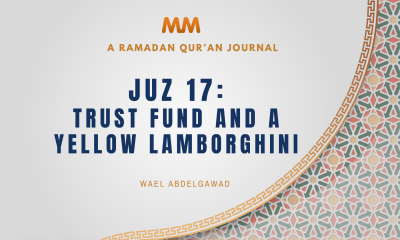

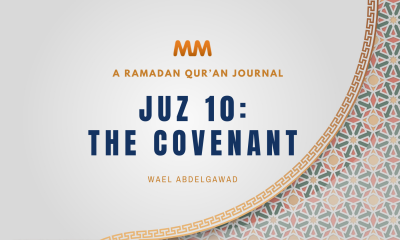


Jamilah Alia Baz
March 28, 2017 at 3:54 AM
This “I am a man of action. I don’t always make the right choice. Sometimes I make dismayingly bad choices. But I don’t sit still and wait for the world to decide for me. Right or wrong, I act.”
Waiting for the next part!!
Nasra Ban
March 28, 2017 at 3:48 PM
Eeekles beaakles i have to wait a whole week for the next part…..
Wael Abdelgawad
March 28, 2017 at 4:07 PM
Eekles beekles, ha ha I never heard that before.
Abdullah Ahmad
March 28, 2017 at 7:51 PM
Mash’Allah!! This story is very intriguing and captivating. I’ve been hooked since your first publication brother, but this story? It beats all! Keep up the good work!
Wael Abdelgawad
March 28, 2017 at 8:59 PM
Thank you Abdullah. I appreciate it. What do you like about this story in particular?
AA
March 28, 2017 at 9:06 PM
Noooooooo you canNOT make us wait a whole week for what comes next!!!!!! argh
Maryam
March 28, 2017 at 10:18 PM
Assalamu Alakum, I was first to read it, Yesterday when I finished “How my husband died” I was dismayed because there was no more, but haha I only had to wait for a day.
Aisha
March 29, 2017 at 10:56 AM
“I averted my gaze. That is what Islam teaches us. And anyway Pinkie – no matter how scantily dressed – could not compete with Safaa in the beauty department”
Assalamalaikum brother,
The bit where he averts his eyes, yet notices enough to compare with his wife feels a bit cheesy.
JazakAllah khair
Wael Abdelgawad
March 29, 2017 at 12:33 PM
Thanks, I changed it.
Naz
March 30, 2017 at 9:48 PM
I personally thought how he said Pinky couldnt match Safaa in the beauty dept was really sweet. It showed how much he cares for her and is enamored by her. Zaid is how all men should be like; their wife is #1 above all else, it could really help prevent infidelity. I didnt think it was cheesy at all but very sweet.
Wael Abdelgawad
March 31, 2017 at 1:14 AM
Lol, okay. I rewrote a bit and I think I found a good balance.
Sumaiyah
March 30, 2017 at 11:22 AM
Jazakallakhair :)
Bint A
March 30, 2017 at 4:43 PM
Asalamu’alaikum br Wael
going well so far mashaAllah. … for some reason Hassan’s Tale really made a lasting impression due to its depth and thoughtfulness and I feel this story would work better if it had elements of your deep reflections weaved into it at certain points
I know it can be a bit hard with Zaid’s light-hearted character but I also trust that being a skilled writer you can accomplish it insha’Allah ;)
maybe after Safa and him are back together and the “poet” or writer in him comes out or at certain turning points in the story. Just a thought.
Also could you please make any revisions to prev. chapters in BOLD so that the readers can refer back easily to what was changed? Appreciate it
Wael Abdelgawad
March 30, 2017 at 4:58 PM
Bint A, that’s all true. Zaid is immature in some ways, and very emotional. He’s full of love for his family, anger over his past, and determination to get the job done. That’s what defines him. I think we’ll see him mature in time. I’ll publish this story as a novel when it’s done, Insha’Allah. If it’s successful I’ll probably write a series of Zaid Karim mysteries, and we’ll see growth in Zaid’s character over time.
And how do you know he and Safaa will get back together? :-)
By the way, the novel-length version of Pieces of a Dream will be published and available on Amazon in about a week, Insha’Allah. I’m sure MM will announce it.
Amatullah
March 31, 2017 at 3:16 AM
Woah! Amazing I must say, waiting for the hardcopy of the novel.
Also, Yes, Zaid and Safaa will be back together because they have to be and are made for each other :) Please don’t end it otherwise.lol
Maryam
April 2, 2017 at 4:39 PM
I was also about to write that the ending where them two come back would be awesome.
-Jazk.
Abdullah
April 4, 2017 at 7:18 PM
Assalamu Alaikum Brother,
Where’s the next part? Eagerly waiting.
Wael Abdelgawad
April 4, 2017 at 7:24 PM
It’s been published. I just forgot to link to it, sorry. Here it is:
Zaid Karim, Private Investigator, Part 9 – Stash House